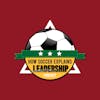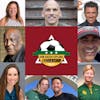Offseason Talks, Volume 1 – Self-Leadership: Know Your Why by Starting at the End

In Episode 33, we are taking a little break from our normal programming to have some offseason talks between Seasons 3 & 4. In these talks, Paul and Phil will be sharing some timeless leadership principles that will help you flourish by knowing...
In Episode 33, we are taking a little break from our normal programming to have some offseason talks between Seasons 3 & 4. In these talks, Paul and Phil will be sharing some timeless leadership principles that will help you flourish by knowing and pursuing your purpose, honing your skills, taking your leadership to the next level. In this first offseason talk, Phil shares about how writing your own eulogy and knowing your why are essential to your ability to lead yourself and others with excellence.
Resources and Links from this Episode
- Uncut Video of the Episode
- HSEL Facebook Group
- Phil and HSEL on Clubhouse -- @phildarke
- Email Phil – phil@howsoccerexplainsleadership.com
- Start with Why: How Great Leaders Inspire Everyone to Take Action, by Simon Sinek
- Living Forward: A Proven Plan to Stop Drifting and Get the Life You Want, by Daniel Harkavy and Michael Hyatt
- 40/40 Vision: Clarifying Your Mission in Midlife, by Peter Greer
Phil: [00:00:00] Welcome back to How Soccer Explains Leadership. I'm Phil Darke, your host. And along with my co-host Paul Jobson, we just want to thank you for this download. We want to thank you for being a part of the show. We want to thank you for all that you do to make this show better. And that, that includes just simply engaging it and talking with other people about it. That includes emailing us with your thoughts with any other guests that you think would be great guests. That includes you talking to us about you yourself, being a guest. We couldn't do the show without you. And we just want to thank you for that. And normally we would have a great guest that we are introducing and that I get to interview.
That's, that's kind of the normal course of action. If you haven't been part of our show, that's what we do. But, we are actually taking a little break. We just finished up season three and we had an amazing season. If you didn't listen to those episodes and those interviews we were able to do, and even the halftime [00:01:00] show and the post-match show with Paul and I talking about Ted lasso and encourage you to go back and listen to those.
Those were some great conversations that I was able to have with other people that I was able to have with Paul. And I have no doubt that you will learn a bunch, just like I learned a bunch, but. We're not going to do those interviews for a few weeks here. We're going to take a break after season three.
As I said to have what we're calling the off season talks, we're just going to have some. Just really monologues. They're going to be, Paul will hopefully be able to do a conversation with Marci about their Warrior Way. Some of the principles that they're teaching in the Warrior Way program that they're teaching kids through the game of soccer.
But really I'm just going to be talking with you through the airwaves, through the podcast world about some of the things that are important to me. That I think are really important to you as well. I'm not going to put that on you, but these are leadership principles that are critical to flourishing in, [00:02:00] in, in my experience, things that I've learned from mentors, things that I've learned from other people who care about me.
And because I care about you, I want to share them with you. So, you know, before I get into the first principle, I just want to remind you that you can connect with us on facebook on that Facebook group. That's a good place to ask questions. That's a good place to share guests. That's a good place to engage some of the episodes and tell us what your favorite parts of the episodes were and your takeaways and any questions you have from those episodes questions you have for our guests to a lot of our guests would absolutely love to answer any questions that you have from them.
So shoot those over on the Facebook group. You can also contact me anytime at Phil@howsoccerexplainsleadership.com. That's a place. I love getting the emails. I respond to them. And, uh, I, I do that personally because I do want to start relationships with you folks. You can connect on social media as well.
And I've had great conversations with a lot of the guests, but also other people who are just people [00:03:00] who have gotten know me and I've gotten to know them through the podcast and through connecting through email or on social media. So I encourage you to do that as well. Also sign up for our newsletter, if you want to find out different things that Paul and I are doing.
Um, the different programs that we have, the different opportunities you can have to connect with us at a deeper level. Uh, we have a few different things. We're working on a few different things we're already doing that we would love to talk about those things with you, drop a drop out your email into the newsletter on the website or the, the.
The field on the website that you can sign up for our newsletter and we'll get that newsletter out to you when we start sending it out and in a little bit. So without more about that, and we'll give a little bit more details at the end of this episode, as well as some of the programs that Paul and I are working on.
But I want to talk today with you about just self-leadership and self-leadership starts in my opinion, as any great organization starts and that's with. Your why Simon Sinek made a lot of money. Um, but through a Ted [00:04:00] talk that he talked for 15 minutes on start with why. And there's a good reason he did because it's a phenomenal phenomenally simple but phenomenal principle that helps us to stay on track. In organizations,
we create our mission in our why, why we exist our purpose statement so that we can stay on track. So we don't drift from that mission. And I've, I believe strongly that we as individuals need to have our personal mission statement as well. Our personal purpose statement, why we exist, our why, so that we can wake up every morning and know this is why I exist.
This is why I do what I do. This is why I do the things I do as an organization has a mission and it has values to be able to put all their different opportunities through a filter. We need to have that same filter as individuals, as human beings. So. I'm just going to tell you right now, my personal, why is to help others to flourish.
And to make good things better. I've said that on this podcast, because I've asked the other guests what their personal why is. I don't want to make sure they know, and you know that [00:05:00] I have mine. I'm not asking them okay. For something that I haven't worked on myself. And I'm not asking you to do anything that I haven't done myself.
And a lot of times I preach to myself. A lot of times I coach myself and oftentimes I even say I'm a better coach than a player, but this is one instance, and I'm glad I have, that I know exactly why I I'm on this, on this earth and I am able to put every opportunity I have through that filter. So that's something I want to encourage you with as well as to, to develop your personal why, and one way to get a good kickstart toward that is to create and write your own eulogy. Yeah. That's, it's kind of a morbid thought. I realize it's something that I I'm sure. I'm not the first person. If you're a leader who is hungry for leadership, a understanding on how to be a better leader. I'm guessing you have heard this before. Maybe you've done it.
Maybe you haven't. If you've done it. Awesome. Use it to make a personal mission statement. If you've already made a personal mission statement, right. Even more awesome. And I'm very glad you have, but I still hope that you can learn something from this and maybe even hone [00:06:00] it, maybe even to take it to be simpler so that you can go through and be able to filter your decisions through it.
But this eulogy concept, isn't something I made up. It's something that I have have read through, uh, 40, 40 vision. It's a book that my friend, Peter Greer wrote something that he has done, um, in his life that he told me in an interview I did with him about, uh, how it's helped him. So that intrigued me. And then I read the book Living Forward, which was a life.
Basically how to create your own life plan. Michael Hyatt, Daniel Harkavy wrote that book together, a fantastic book that really walks you through how to create a life plan that starts with creating your eulogy. And then it works through basically different life accounts that you have. And you can, you can create a mission statement for each of those accounts.
Each of those different things that you have in your life that are important to you. And you're able to really create something that you can go back to over and over to remind [00:07:00] yourself why you exist, remind yourself what's important, what your priorities are. So when you're doing what you do, you can ensure that you're not drifting from your why.
All right. So in developing that eulogy, you're basically starting with the end in mind. You're starting with what you hope when you die someday. And we all will die. We know that. But you hope that you, that people will say about you at your funeral. That's really all you're doing in this eulogy. You're, you're creating.
And in the way this book living forward talks about doing it is take each person that you really care about and cares about you and write down what you hope they'd say about you. And it could be groups of people too. So maybe the kids you coach, what would you hope they say about you? If you're a teacher, what would you hope that the, that your students say about you?
If you're a leader of an organization, what would you hope that your employees say about you? If you're a husband or a wife, what would you hope that your spouse and your kids say about you [00:08:00] when you die and then write those things and create, you know, a page, page and a half, maybe two pages of what you hope people would say about you and what your eulogy would be at your own funeral. And that basically is the legacy that you hope you live in your life. And if you write that out, then you will know when you're doing different things. Yeah. I'm consistent with this. Or, you know what, I've veered off path on this and maybe I'm, I'm pursuing something different and you, I assume you've also heard that saying that, you know, make sure your ladder is on the right building.
Well, really this building and what the top of the ladder is is this legacy, this eulogy statement that you make. And then from that, create that one sentence of a mission of a purpose of your why so that you can live every day with a clear purpose. When someone asks you, why you do what you do, he know that this is why I doing what I'm doing.
So I can say [00:09:00] I help others to flourish and to make good things better. And I can know that when I'm doing DISC straining with a, with a soccer team or with a club or at a university with any, any sport team or any organization, I know that I'm helping to make people flourish and I'm helping to make good organization, good teams, good clubs that much better. When I'm in my organization and I'm working with orphaned and vulnerable children around the world, I'm working with organizations who work with them and I'm helping them. I know that I'm helping people to flourish and to make good things better. And I hope that you have a statement that you have your why that you can go to every day when you wake up and you can go, I want to make sure that I'm doing and this with everything that I do. So that's what I wanted to talk with you about today. And I hope that you learned something today. I know that it reinforces it with me. Every time I teach something, I reinforce it and I learn it better. So I'm going to, I'm going to, to even take what [00:10:00] I talked about today and go back to my life plan and look at it and see how I can hone the statements I can hone the eulogy.
See how I can hone the different life accounts. Yeah. That's something that I hope you do as well. If you have it, hone it. If you don't have it, create it and live it out. So that's my encouragement to you today. I hope that this first off-season talk was something that, that you not only learn from that you're going to be able to use, and you're gonna be able to apply it immediately in your life.
It's it's really self-understanding is the first step to any leadership. If we don't understand ourselves, it's going to be hard for us to lead others. If we don't understand ourselves, it's gonna be hard for us to really communicate well with others. To resolve conflict. To flourish, really, and to help others to flourish, you gotta know yourself, you gotta be healthy with yourself.
So next time we're going to be talking about DISC and, and how it can help you understand yourself as well and how it will help you understand others and why it's so important and why I believe that it's so important. I've talked a little bit on the show about that, but I'm gonna go and dive in deeper to [00:11:00] that.
But as I said earlier in this episode, Paul and I are working on different things. Paul has the Warrior Way. You can Google "Warrior Way Waco" and, uh, you'll, you'll be able to find some information about that. I'm I'm also doing DISC training for clubs, for teams at university, pro, youth levels. If you're interested in that at all, just send me an email, phil@howsoccerexplainsleadership.com.
I'm also building out a course and mastermind for coaches. If you're interested in that, send an email to me about that at the same email address. You can also sign up for our newsletter@howsoccerexplainsleadership.com on the right sidebar. You'll see a little field, you can put your email address in there and we'll be sending email newsletters out to you in the future.
So if that's something that interests you, go ahead and do that as well. But folks, we hope that, uh, you know, Paul and I both, I'm speaking for Paul because I know we've talked about it. We hope that there's this, these interviews that we do, the conversations that we have, and now we're [00:12:00] hoping that these off-season talks that we're having between season three and season four are really something that you use to help you be better leaders to help you be better in every relationship you have. In your marriages, in your parenting, in your coaching.
Um, really just literally in every relationship that you have, we hope that what we're teaching on this show will help you take what you're learning from the game and apply it to your life. What we're learning from the game to help you apply those principles to your lives. What our guests are learning from the game to apply to your lives.
We hope that everything you're learning will help you make to be a better leader. And I also hope as always that you're, that you're using what you're learning on this show to help you to understand that soccer really does explain life and leadership. Thanks a lot. Have a great week.




